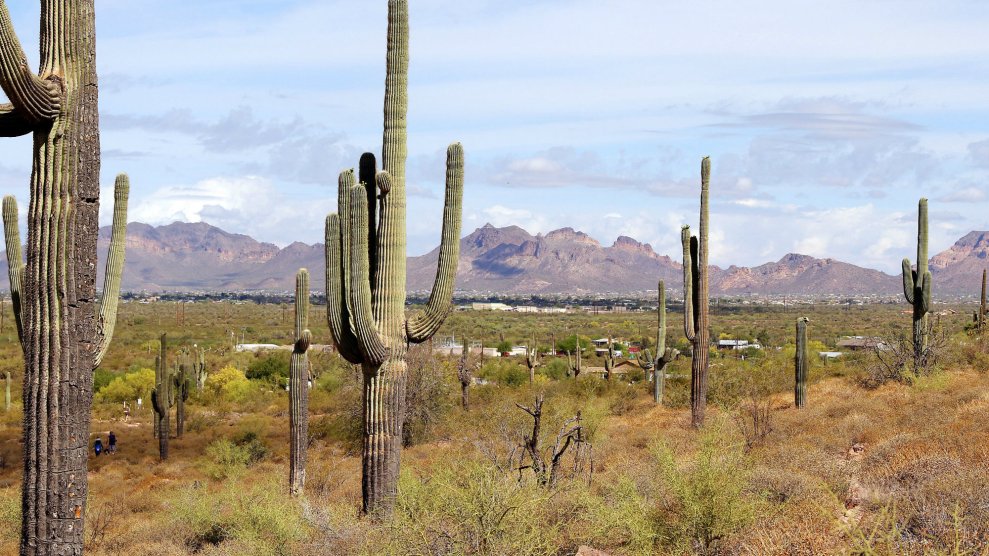MASSACHUSETTS SENATOR ELIZABETH WARREN & CALIFORNIA REP. RO KHANNA
HAVE FILED LEGISLATION TO PROTECT WATER IN THE ARID SOUTHWEST FROM THE GREEDY WHO WOULD PROFIT FROM ITS SALE
Sen. Elizabeth Warren’s Bill Would End Trading in Water Futures
She and Rep. Ro Khanna aim to curtail bets that could worsen a western crisis.
This story was originally published by the Guardian and is reproduced here as part of the Climate Desk collaboration.
With private investors poised to profit from water scarcity in the west, US senator Elizabeth Warren and representative Ro Khanna are pursuing a bill to prohibit the trading of water as a commodity.
The lawmakers will introduce the bill on Thursday afternoon, the Guardian has learned. “Water is not a commodity for the rich and powerful to profit off of,” said Warren, the progressive Democrat from Massachusetts. “Representative Khanna and I are standing up to protect water from Wall Street speculation and ensure one of our most essential resources isn’t auctioned off to the highest bidder.”
Water-futures trading allows investors—including hedge funds, farmers and municipalities—to trade water and water rights as a commodity, similar to oil or gold. The practice is currently limited to California, where the world’s first water futures market was launched. So far, the market hasn’t taken off, dampened by the reality that the physical trade of water in the state has been limited. After a couple of wet years in California, the price of water futures has also plummeted.
But Warren and Khanna’s Future of Water Act has been reintroduced amid growing concerns about meddling from investors in western water rights. The bill was originally introduced two years ago but did not get taken up for a vote. The lawmakers and supporters of the bill argue that now is a crucial moment to re-introduce it—and stop water-futures trading before the climate crisis and booming water speculation threaten to shrink supplies and inflate prices.
A Guardian investigation into an unprecedented $24 million sale of Colorado River water found that corporations have discreetly acquired thousands of acres of farmland—and the water rights that come with them. As water grows increasingly scarce, these firms are poised to make huge profits selling water to thirsty developing communities.
“There’s a big water grab out west that now is a really good time to introduce us to cut off one avenue for these massive financial interests to exploit water scarcity,” said Mary Grant, a campaign director with Food and Water Watch, one of more than 275 environmental and advocacy groups including the Sunrise Movement and the Center for Biological Diversity that have backed the legislation.
“I think we need to stop the market right now. before it takes off,” Grant said.
The first-ever water-futures market—the NASDAQ Veles California Water Index—was launched in 2020 and allowed investors to wager on the price of water and likelihood of water scarcity. The market was initially advertised as a way for California water users, including farmers and municipalities, to hedge their risks against a volatile water market amid diminishing supplies.
No physical water is exchanged in this market. Rather, participants are betting on whether the price of water will go up or down. As the Pacific Institute explains, if a farmer buys water futures for $600 and, when his contract is settled, the price jumps to $800, the seller will owe him $200. The farmer could use that money to purchase physical water, or cover losses.
Interest in water-futures trading has so far remained low. Investors also appeared to be turned off by the fact that the formula and transaction data used to calculate water prices for the futures market are public.
Still, lawmakers, environmental groups and even a UN expert on water and human rights, have been skeptical of the new market, which they said could further the commodification and privatization of water, and even encourage investors to manipulate the real-life water market.
If the water futures market does pick up, “it could give a large financial speculator a really big incentive to actually get involved in the underlying water market,” Grant explained. “They could, for example, buy water rights to drive the price up so that they can then make money on the futures market.”
This story was originally published by the Guardian and is reproduced here as part of the Climate Desk collaboration.
With private investors poised to profit from water scarcity in the west, US senator Elizabeth Warren and representative Ro Khanna are pursuing a bill to prohibit the trading of water as a commodity.
The lawmakers will introduce the bill on Thursday afternoon, the Guardian has learned. “Water is not a commodity for the rich and powerful to profit off of,” said Warren, the progressive Democrat from Massachusetts. “Representative Khanna and I are standing up to protect water from Wall Street speculation and ensure one of our most essential resources isn’t auctioned off to the highest bidder.”
Water-futures trading allows investors—including hedge funds, farmers and municipalities—to trade water and water rights as a commodity, similar to oil or gold. The practice is currently limited to California, where the world’s first water futures market was launched. So far, the market hasn’t taken off, dampened by the reality that the physical trade of water in the state has been limited. After a couple of wet years in California, the price of water futures has also plummeted.
But Warren and Khanna’s Future of Water Act has been reintroduced amid growing concerns about meddling from investors in western water rights. The bill was originally introduced two years ago but did not get taken up for a vote. The lawmakers and supporters of the bill argue that now is a crucial moment to re-introduce it—and stop water-futures trading before the climate crisis and booming water speculation threaten to shrink supplies and inflate prices.
A Guardian investigation into an unprecedented $24 million sale of Colorado River water found that corporations have discreetly acquired thousands of acres of farmland—and the water rights that come with them. As water grows increasingly scarce, these firms are poised to make huge profits selling water to thirsty developing communities.
“There’s a big water grab out west that now is a really good time to introduce us to cut off one avenue for these massive financial interests to exploit water scarcity,” said Mary Grant, a campaign director with Food and Water Watch, one of more than 275 environmental and advocacy groups including the Sunrise Movement and the Center for Biological Diversity that have backed the legislation.
“I think we need to stop the market right now. before it takes off,” Grant said.
The first-ever water-futures market—the NASDAQ Veles California Water Index—was launched in 2020 and allowed investors to wager on the price of water and likelihood of water scarcity. The market was initially advertised as a way for California water users, including farmers and municipalities, to hedge their risks against a volatile water market amid diminishing supplies.
No physical water is exchanged in this market. Rather, participants are betting on whether the price of water will go up or down. As the Pacific Institute explains, if a farmer buys water futures for $600 and, when his contract is settled, the price jumps to $800, the seller will owe him $200. The farmer could use that money to purchase physical water, or cover losses.
Interest in water-futures trading has so far remained low. Investors also appeared to be turned off by the fact that the formula and transaction data used to calculate water prices for the futures market are public.
Still, lawmakers, environmental groups and even a UN expert on water and human rights, have been skeptical of the new market, which they said could further the commodification and privatization of water, and even encourage investors to manipulate the real-life water market.
If the water futures market does pick up, “it could give a large financial speculator a really big incentive to actually get involved in the underlying water market,” Grant explained. “They could, for example, buy water rights to drive the price up so that they can then make money on the futures market.”
AN IMPORTANT UPDATE
ADDITIONAL RELATED ARTICLES:






No comments:
Post a Comment
Note: Only a member of this blog may post a comment.